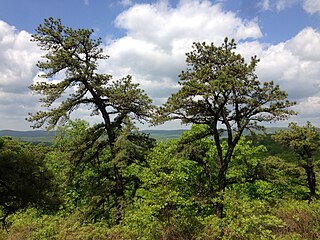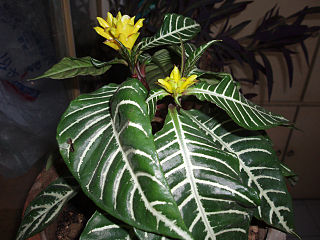
Pinus rigida, the pitch pine, is a small-to-medium-sized pine. It is native to eastern North America, from central Maine south to Georgia and as far west as Kentucky, and in two pockets along the St. Lawrence River in southern Quebec and Ontario. It is found in environments which other species would find unsuitable for growth such as acidic, sandy, and low nutrient soils. This species occasionally hybridizes with other pine species such as loblolly pine, shortleaf pine, and pond pine ; the last is treated as a subspecies of pitch pine by some botanists.

Aphelandra is a genus of about 170 species of flowering plants in the family Acanthaceae, native to tropical regions of the Americas.

Juniperus rigida, the temple juniper, is a species of juniper, native to northern China, Mongolia, Korea, Japan, and the far southeast of Russia, occurring at altitudes of 10-2,200 m. The species is also naturalized in the United States. It is closely related to Juniperus communis and Juniperus conferta, the latter sometimes treated as a variety or subspecies of J. rigida.
Aphelandra albinotata is a species of plant in the family Acanthaceae. It is endemic to Ecuador. Its natural habitat is subtropical or tropical moist montane forests. It is threatened by habitat loss.
Aphelandra anderssonii is a species of plant in the family Acanthaceae. It is endemic to Ecuador. Its natural habitat is subtropical or tropical moist montane forests. It is threatened by habitat loss.
Aphelandra attenuata is a species of plant in the family Acanthaceae. It is endemic to Ecuador. Its natural habitat is subtropical or tropical dry forests. It is threatened by habitat loss.
Aphelandra azuayensis is a species of plant in the family Acanthaceae. It is endemic to Ecuador. Its natural habitat is subtropical or tropical moist montane forests. It is threatened by habitat loss.
Aphelandra chrysantha is a species of plant in the family Acanthaceae. It is endemic to Ecuador. Its natural habitat is subtropical or tropical moist montane forests. It is threatened by habitat loss.
Aphelandra cinnabarina is a species of plant in the family Acanthaceae. It is endemic to Ecuador. Its natural habitat is subtropical or tropical moist montane forests. It is threatened by habitat loss.
Aphelandra guayasii is a species of plant in the family Acanthaceae. It is endemic to Ecuador. Its natural habitat is subtropical or tropical dry forests. It is threatened by habitat loss.
Aphelandra gunnari is a species of plant in the family Acanthaceae. It is endemic to Ecuador. Its natural habitat is subtropical or tropical moist montane forests. It is threatened by habitat loss.
Aphelandra harlingii is a species of plant in the family Acanthaceae. It is endemic to Ecuador. Its natural habitat is subtropical or tropical moist montane forests. It is threatened by habitat loss.
Aphelandra loxensis is a species of plant in the family Acanthaceae. It is endemic to Ecuador. Its natural habitat is subtropical or tropical moist montane forests. It is threatened by habitat loss.
Aphelandra phaina is a species of plant in the family Acanthaceae. It is endemic to Ecuador. Its natural habitat is subtropical or tropical moist montane forests. It is threatened by habitat loss.
Aphelandra sulphurea is a species of plant in the family Acanthaceae. It is endemic to Ecuador. Its natural habitat is subtropical or tropical moist lowland forests. It is threatened by habitat loss.

Zebra plant is a common name for several plants and may refer to:

Acampe rigida is a species of orchid native to the forests of tropical southern Asia where it grows on trees and rocks at altitudes of up to 1,800 m (6,000 ft).

Persoonia rigida, commonly known as the rigid-, hairy- or stiff geebung, is a species of flowering plant in the family Proteaceae and is endemic to south-eastern Australia. It is an erect to low-lying shrub with hairy young branchlets, lance-shaped to spatula-shaped leaves that are hairy when young, and yellow flowers borne in groups of up to twenty on a rachis up to 90 mm (3.5 in) long that continues to grow after flowering.

Hakea rigida is a shrub of restricted distribution in the western Goldfields region of Western Australia bearing sprays of pink flowers in spring.

Petrophile rigida is a species of flowering plant in the family Proteaceae and is endemic to southwestern Western Australia. It is a shrub with rigid, branched, needle-shaped, sharply-pointed leaves, and more or less spherical heads of hairy yellow flowers.
This page is based on this
Wikipedia article Text is available under the
CC BY-SA 4.0 license; additional terms may apply.
Images, videos and audio are available under their respective licenses.






